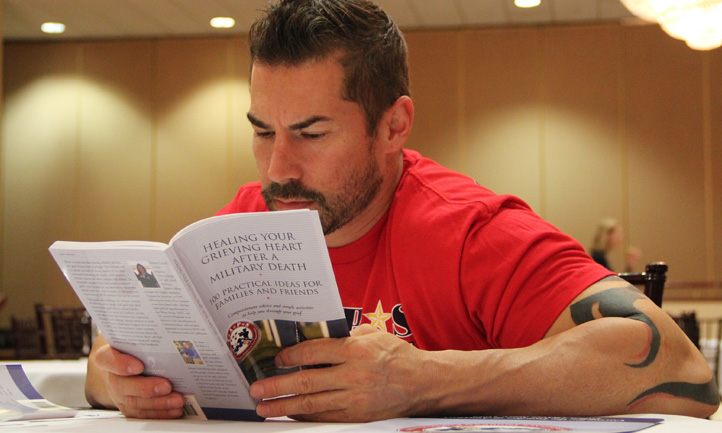Healing Your Grieving Heart
Authors: Bonnie Carroll , Alan Wolfelt
“Believe in the wonderment of life, the magic of love, and the reality of death.” – Carroll Bryant
You may have heard of the "stages" of grief, popularized in 1969 by Elisabeth Kübler-Ross's landmark text, On Death and Dying. In this book she lists the five stages of grief that she saw terminally ill patients experience in the face of their own impending deaths: denial, anger, bargaining, depression, and acceptance. However, she never intended for her five stages to be applied to all grief or to be interpreted as a rigid, linear sequence to be followed by all mourners.

Usually, grief hurts more before it hurts less. This is because the initial numbing eventually wears off, often right about the time when friends and family withdraw their support, assuming you are doing better.
You will probably experience a multitude of different emotions in a wave-like fashion. You will also likely encounter more than one need of mourning at the same time. Understandably, survivors of sudden, violent death also tend to spend more time and effort on the first need of mourning: acknowledging the reality of the death.
1. Acknowledge the reality of the death.
Your first need of mourning is to gently confront the difficult reality that someone you love is dead and will never physically be present to you again.
Even when a death is anticipated, acknowledging the full reality of the loss may take weeks or months. Accepting the reality of sudden and violent deaths usually takes longer.
You will first come to acknowledge the reality of the loss with your head. Only over time will you come to acknowledge it with your heart. As Stephen Levine has noted, "There are pains that cannot be contained in the mind, only in the heart."
At times you may push away the reality of the death. This is normal. You will come to integrate the reality in doses as you are ready.
You may be saying to yourself, "I feel like I'm dreaming. I keep hoping I'll wake up and none of this will have happened." We hear this often from trauma survivors. Your shock protects you from being overwhelmed by the loss. You need and deserve time to reconstitute yourself after this traumatic death. You need time to become accustomed to thinking and feeling in your new reality. Go slow. There are no rewards for speed.
2. Embrace the pain of the loss.
This need of mourning requires us to embrace the pain of our loss - something we naturally don't want to do. It is easier to avoid, repress, or push away the pain of grief than it is to confront it.
It is in embracing your grief, however, that you will learn to reconcile yourself to it.
You will need to slowly - ever so slowly - "dose" yourself in embracing your pain. If you were to allow in all the pain at once, you could not survive.
People with chronic physical pain are taught not to tighten around the pain but to relax and allow the pain to be present. When pain is resisted, it intensifies. You don't want to fight with your pain; you want to allow it into your soul in small doses so that eventually you can move from darkness to light.
3. Remember the person who died.
When someone loved dies, they live on in us through memory.
To heal, you need to actively remember the person who died and commemorate the life that was lived.
Never let anyone take your memories away in a misguided attempt to save you from pain. It's good for you to continue to display photos of the person who died. It's good to talk about him. It's good to save belongings and mementos of his life.
Remembering the past makes hoping for the future possible. As Danish philosopher and theologian Søren Kierkegaard noted, "Life can only be understood backwards, but it must be lived forwards."
4. Develop a new self-identity.
Part of your self-identity was formed by the relationship you had with the person who died.
You may have gone from being a "wife" to a "widow" or from a "parent" to a "bereaved parent." The way you thought of yourself and the way society thinks of you has changed.
The part of your identity that was shaped by your military status or affiliation is also morphing. The military is very good at creating a strong culture - regulations and processes and ways of talking and thinking that bind military members and their families together. This culture may have given you a sense of belonging. But now that your military ties may be dissolving, what does that mean for the part of you that identified as a military family member?
You need to re-anchor yourself, to reconstruct your self-identity. This is arduous and painful work. One of your biggest challenges may be to recreate yourself in the face of the loss of who you once were. Let us assure you that you can and will do this.
Many mourners discover that as they work on this need, they ultimately discover some positive changes to their self-identities, such as becoming more caring or less judgmental.
5. Search for meaning.
When someone loved dies, we naturally question the meaning and purpose of life and death. It's hard - maybe even impossible - to make sense of a death that can seem so senseless. While some people find profound meaning in the idea of sacrifice to country, others struggle with what can seem like the squandering of a precious life. And it's not uncommon for survivors to feel a little of both! Regardless of your feelings about the circumstances of the death, it is normal and necessary to struggle with the "why" and try to find meaning.
"Why?" questions often precede "How" questions. "Why did this happen?" comes before "How long will I go on living?"
You will probably question your philosophy of life and explore religious and spiritual values as you work on this need. You may also find yourself questioning the military's rationale or decision-making that contributed to your loved one's death. After someone you love is taken from you, it's normal to question.
Remember that having faith or spirituality does not negate your need to mourn. "Blessed are those who mourn for they shall be comforted."
Some people may tell you that asking "Why?" doesn't do you any good. These people are usually unfamiliar with the experience of traumatic grief. Try to reach out to people who can create a supportive atmosphere for you right now.
6. Receive ongoing support from others.
As mourners, we need the love and understanding of others if we are to heal.
Don't feel ashamed by your dependence on others right now. Instead, revel in the knowledge that others care about you.
Unfortunately, our society places too much value on "carrying on" and "doing well" after a death. Because of this, many mourners are abandoned by their friends and family soon after the death. It has been said that grief rewrites your address book.
One of the touchstones of grief is that each and every one of us as humans are connected by loss. As you experience the physical separation from someone you love, you are connected to every signle person who has experienced or ever will experience a similar loss. Part of the TAPS motto encourages us to "share the journey."
When others offer to help, tell them something practical they can do, such as babysit, grocery shop, or mow the lawn.
Grief is a process, not an event, and you will need the continued support of your friends and family for weeks, months, and years.
Though the "Needs of Mourning" are numbered one through six, grief is not an orderly progression towards healing. Don't fall into the trap of thinking your grief journey will be predictable or always forward-moving.
Be compassionate with yourself as you experience your own unique grief journey.
Excerpted from Healing Your Grieving Heart After a Military Death (Companion Press, 2015)
TAPS is proud to announce our new book of comfort and care, written with love for all who are grieving a loss in the military.
If you haven't received your copy yet, please write to info@taps.org today. Please provide your current mailing address.
By Bonnie Carroll and Dr. Alan Wolfelt:  Bonnie Carroll, a People Magazine “Hero Among Us” and retired Air Force Reserve Officer, founded the Tragedy Assistance Program for Survivors (TAPS), following the death of her husband in an Army plane crash. She has held political appointments in the White House, DOD, and VA; served in Baghdad as an Advisor to the Iraq Ministry of Communications; and has been appointed to numerous DOD and VA advisory boards and taskforces.
Bonnie Carroll, a People Magazine “Hero Among Us” and retired Air Force Reserve Officer, founded the Tragedy Assistance Program for Survivors (TAPS), following the death of her husband in an Army plane crash. She has held political appointments in the White House, DOD, and VA; served in Baghdad as an Advisor to the Iraq Ministry of Communications; and has been appointed to numerous DOD and VA advisory boards and taskforces.
 Dr. Alan Wolfelt is a noted author, educator, and grief counselor. He has written many compassionate, bestselling books that help people mourn well so they can go on to live well and love well, including Healing Your Grieving Heart After a Military Death (coauthored with TAPS' own Bonnie Carroll), Healing A Parent's Grieving Heart, and The PTSD Solution: The Truth About Your Symptoms and How to Heal. Visit www.centerforloss.com to learn more about the natural and necessary process of grief and to order Dr. Wolfelt's books.
Dr. Alan Wolfelt is a noted author, educator, and grief counselor. He has written many compassionate, bestselling books that help people mourn well so they can go on to live well and love well, including Healing Your Grieving Heart After a Military Death (coauthored with TAPS' own Bonnie Carroll), Healing A Parent's Grieving Heart, and The PTSD Solution: The Truth About Your Symptoms and How to Heal. Visit www.centerforloss.com to learn more about the natural and necessary process of grief and to order Dr. Wolfelt's books.
